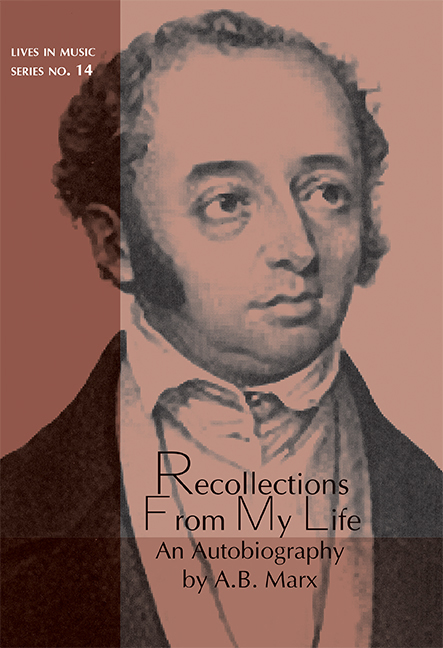Book contents
- Frontmatter
- Contents
- Introduction
- Select Bibliography
- Contents of Volume One
- 1 My Father's House
- 2 Musical Beginnings
- 3 War
- 4 Starting with Composition and Theory
- 5 The Theater in Weimar
- 6 War, again
- 7 The University
- 8 Early incentives for the practice of law
- 9 Legal practitioners
- 10 From Halle to Naumburg
- 11 To Berlin
- 12 Berlin
- 13 Fata Morgana
- 14 Personal relationships
- 15 The Berlin Opera at its height
- 16 Spontini
- Contents of Volume Two
- Afterword in place of foreword
- Translator's Note on Indexing
12 - Berlin
from Contents of Volume One
- Frontmatter
- Contents
- Introduction
- Select Bibliography
- Contents of Volume One
- 1 My Father's House
- 2 Musical Beginnings
- 3 War
- 4 Starting with Composition and Theory
- 5 The Theater in Weimar
- 6 War, again
- 7 The University
- 8 Early incentives for the practice of law
- 9 Legal practitioners
- 10 From Halle to Naumburg
- 11 To Berlin
- 12 Berlin
- 13 Fata Morgana
- 14 Personal relationships
- 15 The Berlin Opera at its height
- 16 Spontini
- Contents of Volume Two
- Afterword in place of foreword
- Translator's Note on Indexing
Summary
For me, moving to Berlin was no small thing. I had never visited any city larger than Halle; and now Berlin was waiting for me, which I did not even know through contemporary depictions. And the biting witticisms of Lessing and Jean Paul were still unknown to me; one was known to have called Berlin a house of forced labor, and the other a galley of criminals. I knew and had enjoyed Goethe's Muses and Graces in the Mark, without it awaking any further considerations on my part. For me, and all more distant scholars remained only in the light that “old Fritz”, and before him, the great Elector had poured upon it — a fatal favor, if their successors allowed themselves to be misguided, and not to stride strongly and heroically forward, as those had done in their time. Then, too, this Berlin was also the capital of Prussia, and Prussia for me, as for all was the protective power under whose leadership Germany would find itself united as the “State of Intelligence”, in which spiritual life had to find its freest development and most propitious encouragement. And thus there was the prospect of approaching the rich artistic institutions and the working circles of so many exceptional men.
I considered it essential to create the means for myself that would make access possible. Twenty-four letters of recommendation, not more, not less, were my endowment; along with fifty thalers, which a generous supporter had loaned me. The basis of my fortune thus amounted to: negative 50 thalers. The costliest item however, was a patronage that I would receive that the conclusion of my stay in Halle.
At that time the renowned Hendel-Schütz lived in Halle as the spouse of Professor Schütz. She was known in a somewhat earlier period to have been one of the leading ornaments of the German stage. While our queens of the stage generally still in later years tried, with desperate zeal tried to hang on to the roles of young lovers, she had, in the brilliance of her highest youthful beauty, preferred to choose older roles, for example, the mother of Coriolanus.
- Type
- Chapter
- Information
- Recollections From My LifeAn Autobiography by A. B. Marx, pp. 63 - 70Publisher: Boydell & BrewerPrint publication year: 2017

